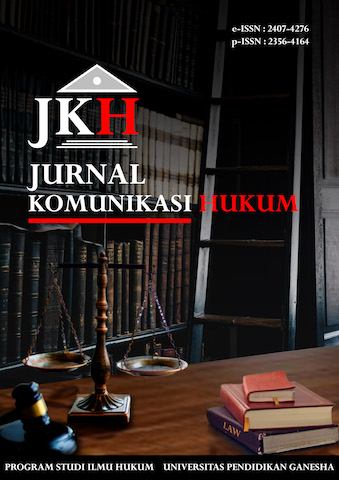KONSTRUKSI HUKUM PIDANA YANG BERKEMANFAATAN DALAM PENANGANAN TINDAK PIDANA PENYALAHGUNAAN NARKOTIKA
DOI:
https://doi.org/10.23887/jkh.v9i1.55354Abstract
This paper is intended to analyze the legal ideals in the form of benefits in handling narcotics abuse. The handling of narcotics abuse has received attention because it is implicated in the overcapacity of the Correctional Institution with its derivative problems. Through the juridical-normative method, this research was carried out using a statutory, case, and conceptual approach. Primary, secondary and tertiary legal materials were collected through literature study. Analysis of the legal materials that have been collected, selected, and systematized is carried out qualitatively and This paper is intended to analyze the legal ideals in the form of benefits in handling narcotics abuse. The handling of narcotics abuse has received attention because it is implicated in the overcapacity of the Correctional Institution with its derivative problems. Through the juridical-normative method, this research was carried out using a statutory, case, and conceptual approach. Primary, secondary and tertiary legal materials were collected through literature study. Analysis of the legal materials that have been collected, selected, and systematized is carried out qualitatively and written in a descriptive-prescriptive manner. The results of the study indicate that the handling of narcotics crimes for abusers leads to punishment. In Buleleng Regency based on court decisions for the last three years from 2019-2021 the average number of abusers shows 29 people. This figure contributes to the overcapacity of prisons which reaches 160%. This phenomenon becomes a reference for judges to make decisions according to the subsidiarity nature of criminal law. Criminal as the ultimum remedium when other means have not been able to solve the problem. Punishment is not sufficient to provide specific or general prevention. Meanwhile, prisons whose main task is to repair and reintegrate social actors are not optimal in carrying out their roles. When reintegration is not optimal, stigmatization appears that degrades the rights of perpetrators to access livelihoods. Benefit occurs when the double track system is criminal and actions can be carried out proportionally based on a strong assessment. Through rehabilitation, the negative impact of sentencing can be avoided and minimize over capacity in prisons.
Downloads
Published
How to Cite
Issue
Section
License
Authors who publish with this journal agree to the following terms:- Authors retain copyright and grant the journal right of first publication with the work simultaneously licensed under a Creative Commons Attribution License that allows others to share the work with an acknowledgement of the work's authorship and initial publication in this journal.
- Authors are able to enter into separate, additional contractual arrangements for the non-exclusive distribution of the journal's published version of the work (e.g., post it to an institutional repository or publish it in a book), with an acknowledgement of its initial publication in this journal.
- Authors are permitted and encouraged to post their work online (e.g., in institutional repositories or on their website) prior to and during the submission process, as it can lead to productive exchanges, as well as earlier and greater citation of published work (See The Effect of Open Access).
Authors who publish with this journal agree to the following terms:
- Authors retain copyright and grant the journal right of first publication, with the work [SPECIFY PERIOD OF TIME] after publication simultaneously licensed under aCreative Commons Attribution License that allows others to share the work with an acknowledgement of the work's authorship and initial publication in this journal.
- Authors are able to enter into separate, additional contractual arrangements for the non-exclusive distribution of the journal's published version of the work (e.g., post it to an institutional repository or publish it in a book), with an acknowledgement of its initial publication in this journal.
- Authors are permitted and encouraged to post their work online (e.g., in institutional repositories or on their website) prior to and during the submission process, as it can lead to productive exchanges, as well as earlier and greater citation of published work (See The Effect of Open Access).












